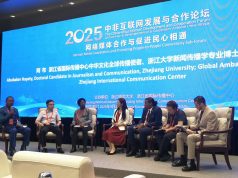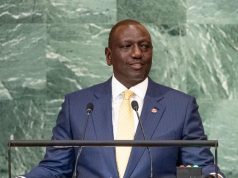IKENNA EMEWU
Institutions, organisations create identities and peculiarities in diverse ways. The Institute of African Studies of Zhejiang Normal University (IASZNU) is one of such.
To this institute, knowledge, courses of study should be interwoven, non-isolating, and inclusive to be meaningful in creating the right impact of charting a course for a pragmatic society.
In common parlance, when an idea is touted just for the sake of knowledge and not necessarily aimed at achieving an immediate objective, it is derisively dubbed an academic exercise. The reason is that in academia, many topics are just studied and theorised for the classroom and not actually adopted to advance society.
But at the IASZNU, Prof. Liu Hongwu’s brainchild, courses of study should have a direct bearing on society, with the intent of implementing change that impacts everyday life.
IASZNU has become a fulcrum of palpable impact, in being the intellectual base of China-Africa cooperation. Liu himself had a study stint in Africa – Nigeria, and later Tanzania. That gave him the inclination to think out how best to provide the intellectual foundation for Africa and China to know each other more deeply. The culmination of his passion is the founding of this Institute close to two decades ago.
But the name and objectives are not as unique as the procedure and dimensions of it. During interviews and interactions at the IASZNU in a month-long media research project, I found out that the procedure of this Institute is as diverse as it is creative.
Its aim is still the need to provide the intellectual beacon for Chinese scholars to know Africa better, see Africa as worth a study effort, and through such a better understanding, knowing will become loving. So far, it is paying handsomely with hundreds of Chinese scholars over the years taking up courses of research on Africa and right inside Africa as participants.
To the linguist scholar, the target is the linguistic correlation between China and Africa, and using this understanding to draw closer to Africa. To the economist, anthropologist, environmental scientist, business scholar, media professional, musical scholar, technologist, cinematographer, child psychologist, and history scholar, the same inclination applies. They all enlist under the IASZNU umbrella and are drawn from their various colleges and departments, get the university’s support and the backing of the government of China to cover the bills and move over to Africa to explore in line with their fields.
From what the institute does, all courses and the entirety of the university curriculum must find convergence somewhere, and must have the prime objective of possessing the ingredients to make the world better, especially China and Africa, in this particular effort. Education in the universities must possess the foresight of contributing to building a better a knowledge-based world, and also foster world peace.
Area, Country, interdisciplinary module
On May 17, I was still there at the Institute when Zhejiang Normal University hosted a large conference of Chinese experts drawn from over 50 universities on how best to deepen and utilise the Area and Country Study from the perspective of Interdisciplinary enhancement to advance academic curricular with direct bearing on creating a better society and world. The keynote address was delivered by Prof. Liu, the brain behind IASZNU and the large trapping it has generated.
Today, in the Chinese academic circles, this slogan is the rave and has caught the waves. He had tasked the gathering of experts to approach this area of academic pursuit from 10 major areas and views, including; fieldwork as the foundation, learning from local communities, culture adaptation and survival skills, bridging China and target regions, building human networks, academic ambition and long-term vision, aligning with national strategy, alignment through interdisplinarity, team-based collaboration, and finally a longitudinal commitment.
The day I spoke with Prof. Hu Meixin, Dean of the College of Foreign Languages, she explained better how this works and has been scoring goals. She discussed the book translation projects of the Linguistics Department and some other collaborations they have with the Institute, powering the special focus module.
Friendship reality
Just yesterday, one of such Chinese scholars, Mr. Cao Junfeng at the University of Ibadan had a discussion with me for his fieldwork on China-Africa media relations and partnership, and how best to use this medium to truly advance the knowledge of each other. Our 70-minute discussion as a practitioner in the media made him understand things he barely knew about the Nigerian media as it relates to China, and how the relationship can develop.
He listened to my story on the progress the topic has made in the past nine years. He heard things that straightened up misconceptions about the Chinese media in Nigeria, and why some of the things he had heard were not correct. But through his interaction with Nigerians in the past year in Nigeria, made possible by the IASZNU platform, Cao has formed a very warm and positive impression of the average Nigerian. He said it matter-of-factly that Nigerians love Chinese people, and that he never got cold shoulders from Nigerians. They are rather very keen to meet him, assist him whenever he needs that. He assesses that Nigerians love the Chinese so much. He brought up this topic when I mentioned to him that years ago, a BBC assessment and social research discovered that among all the countries of the world, Russia and Nigeria are the most loving of China and the Chinese. Interestingly, while at the Institute for a month, those who were truly friendly with me were two who had done their research in Nigeria.
30+ African partners and more

At the last count, IASZNU’s prominence and appeal have earned it over 30 partners as universities, specialised institutes, and lastly, about five media organisations. In Nigeria alone, it has six partner universities – University of Nigeria, Nsukka, University of Lagos, University of Ibadan, University of Abuja, University of Port Harcourt, and Bayero University, Kano. The Nigerian Institute of International Affairs is in the list. For the media, Africa China Economy Magazine leads others such as Money Report Magazine, The Niche Newspaper, a radio station, and an online newspaper, thenewshaus.com, which are about subscribing. The Nigerian media groups indicated their interest after the Institute inaugurated the China-Africa Media Research and Communications Centre on May 31.










